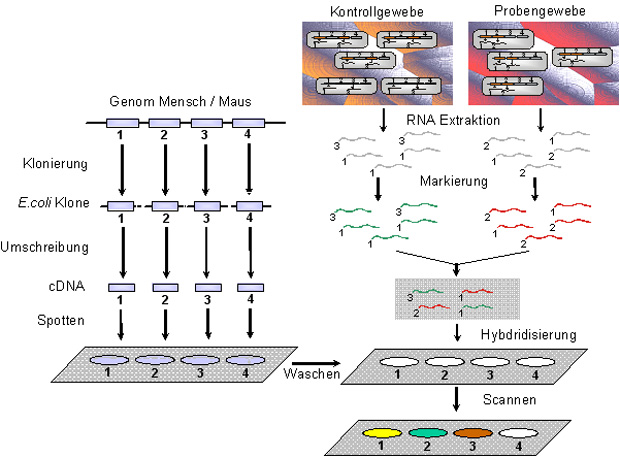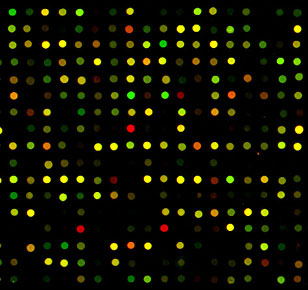RNA-Expression Profiling Using DNA-Microarrays
Dr. Meinhard Hahn
The group is part of the microarray facility of the DKFZ. National cooperation partners and NGFN-2 collaborators are provided with murine and human high density cDNA and 70mer microarrays produced by us under standardized conditions. Our activities particularly include the further development of this technology as well as the optimization of the process protocols. The scientific focus is on the analysis of pathomechanisms and the identification of target genes for diagnosis, prognosis and therapy of human diseases.
RNA-Expression Profiles
The human genome is supposed to include 25,000 protein coding genes which develop their activity in a complex time and compartment specific manner. Therefore, the knowledge of quantitative and qualitative gene expression profiles of cell or tissue types is of central evidence for the understanding of gene activity in a complex biological process. Global expression profiles can be analysed to determine the molecular phenotype of a cell. Dynamic molecular changes associated with cell differentiation, proliferation, apoptosis and specific development stages as well as cellular response to pharmaceutical drugs and treatments can be investigated by the analysis of global expression profiles.

Fig. 1: Schematic presentation of the performance of microarray experiments.

Fig. 2: Section of the fluorescence image of a hybridized 70mer microarray.
To achieve this we apply the DNA-microarray technique using PCR-amplified gene specific cDNA-fragments or chemically synthesised gene specific 70mer oligonucleotides immobilized on glass surfaces. Transcripts isolated from tumor tissues are transcribed into cDNA, thereby fluorophore-labelled and, hereafter, hybridised to the DNA-microarray (see Figures 1 and 2). Thus, we developed, e. g., an “Oncochip”, containing 7,000 gene-specific probes wherein 2,800 have oncologic / hematopoietic relevance (e. g., involved in cell cycle, apoptosis induction, erythropoiesis and mitosis). This microarray is used for expression profiling of hematological neoplasias [Neben et al., 2004; Neben et al., 2005] and, particularly, of tumors of the central nervous system (e. g., ependymomas [Korshunov et al., 2003], meningiomas [Wrobel et al., 2004], medulloblastomas [Neben et al., 2004], oligodendrogliomas, glioblastomas). These studies are supplemented and verified with quantitative real-time PCR, e. g., [Korshunov et al., 2003]. We can conclude that with expression profiling studies we are able to find several aspects of biochemical pathways playing a role in the tumor entities investigated. Important insights into tumor biology can be gained.
Publications concerning this work:
- Identification of novel oligodendroglioma-associated candidate tumor supressor genes in 1p36 and 19q13 using microarray-based expression profiling
- Microarray-based screening for molecular markers in medulloblastoma revealed STK15 as independent predictor for survival.
- Gene expression patterns in acute myeloid leukemia correlate with centrosome aberrations and numerical chromosome changes.
- Distinct gene expression patterns associated with FLT3- and NRAS-activating mutations in acute myeloid leukemia with normal karyotype.
- Microarray-based gene expression profiling of benign, atypical and anaplastic meningiomas identifies novel genes associated with meningioma progression.
Funding
This project is funded by the German Federal Ministry for Education and Research (BMBF) within the 'Nationales Genomforschungsnetzwerk' (NGFN-2), by the EU/FP6 integrated project “MolTools” and by the Deutsche Forschungsgemeinschaft (DFG) within the Research Training Group 886 „Molecular imaging methods for the analysis of gene and protein expression“.



(click icons to go to Ngfn, MolTools and DFG Research Training Group 886)
